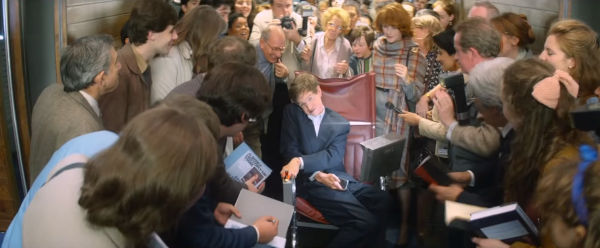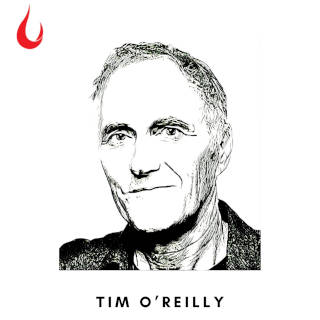[Photo by humberto chavez on Unsplash]
Good morning,
Public speaking can be a nerve-racking exercise for most people, particularly when presenting to an audience that may be familiar with the theme you are talking about. What level of familiarity do you assume they have? Philosopher Daniel Dennett deals with just this in his book Intuition Pumps and Other Tools for Thinking.
“To overexplain something to a fellow expert is a very serious insult—’Do I have to spell it out for you?’—and nobody wants to insult a fellow expert. So just to be safe, people err on the side of under-explaining. It is not done deliberately, for the most part, and it is almost impossible to keep from doing—which is actually a good thing, since being polite in an unstudied way is a nice character trait in anyone. But this gracious disposition to assume more understanding than is apt to be present in one’s distinguished audience has an unfortunate by-product: experts often talk past each other.
“But there is an indirect and quite effective cure: have all experts present their views to a small audience of curious non experts.” These are people whom he knows are curious students who want to learn more on a theme. They are informed that they will be in a room full of experts and that their role is to sit in as decoys.
“By addressing their remarks to the decoy audience, speakers need not worry at all about insulting the experts because they are not addressing the experts...,” Dennett writes. “They are not to accept anything they don’t understand. They will be expected to raise their hands, to interrupt, to alert the experts to anything they find confusing or vague. (They do get required reading to pore over beforehand so that they are not utter novices on the topic; they are interested amateurs.) They love the role, and so they should; they are being given made-to-order tutorials from some big guns. The experts, meanwhile, often find that being set the task (well in advance) to explain their position under these conditions helps them find better ways of making their points than they had ever found before.”
Turns out it’s a win-win for everyone. Whoever would have thought of that?
In this issue
- Rehumanising Stephen Hawking
- What next for Silicon Valley?
- The generation gap
Have a great day.
Rehumanising Stephen Hawking
Everybody loves Stephen Hawking. Even if everybody doesn’t love Stephen Hawking, everybody admires Stephen Hawking. We only have to flip through the pages of magazines that have carried his profile, or the movies based on his extraordinary life to get a sense of the respect everyone has for him.

[A scene from the movie The Theory of Everything (with Eddie Redmayne playing Stephen Hawking)]
However, a new biography—Hawking Hawking: The Selling of a Scientific Celebrity by Charles Seife—throws fresh light on him not so much with the intention of throwing muck at a great man, but to demonstrate that he too is human with all human frailties. As an in depth review by Philip Ball in The Prospect magazine points out, “veteran science writer Charles Seife’s warts-and-all biography doesn’t hold back from exploring Hawking’s less appealing sides. This is long overdue—not so much because Hawking needs cutting down to size, but because he needs to be rehumanised.”
Here’s an extract from the review: “Ironically, the bestselling ‘historian’ of time seems stuck in the past, known throughout his life to put up posters of Marilyn Monroe in his office, visit ‘gentlemen’s clubs’ and claim that women were ‘a mystery.’ His 2013 autobiography My Brief History was unrevealing; Nature’s reviewer compared it to something ‘issued by the public relations department of an institution.’ When theoretical physicist Leonard Susskind, one of Hawking’s sparring partners, says that ‘none of us were ever really able to know him,’ that’s not solely because Hawking’s illness trammelled his communications. Beneath the mixture of gauche jokiness and arrogance seems to have been an almost wilful lack of self-knowledge. He had no more time for self-pity than for self-doubt; a little more of both would have given his human relationships greater depth.
“Hawking’s 1988 book A Brief History of Time secured his celebrity. That it famously went unread, or unfinished, by many of its purchasers would for any other science communicator be a sign of failure. The book was like a Latin liturgy, filled with terms like the readership only half-understood. It played into the unhelpful notion that science is really hard and only for super-humans like him. As Seife shows, it only became even remotely readable through the intense effort of assistants and science writers enlisted by the publisher to translate Hawking’s dense and plodding prose. (Seife explains these ideas more clearly than Hawking ever did.)
“What Hawking’s book did offer was a highly marketable grandiosity, summed up in its most famous line: ‘If we find the answer to that, it would be the ultimate triumph of human reason—for then we would know the mind of God.’ It established Hawking’s image of an amazing mind in a failed body. Hereafter it was not enough to regard Hawking (accurately) as one of the top 100 theoretical physicists in the world; he had to be—‘in spite of it all’—a second Newton or Einstein.”
Dig deeper
What next for Silicon Valley?
Over the years many narratives have been written about how Silicon Valley emerged. Many efforts were made to re-create the ethos that made the place what it is. But what everyone agrees upon is that there is no place quite like Silicon Valley. However, in the aftermath of the pandemic, questions are resurfacing on the future of Silicon Valley.

“Many Silicon Valley investors have been lucky rather than smart.”
Harvard Business Review outlined four trends that suggest this. “The environment that allowed companies like Facebook, Amazon, Google, Apple, and Microsoft to flourish might not exist for much longer: the stifling dominance of top tech giants; changing investor attitudes; increased scrutiny from regulators, the media, and the public; and a growing emphasis on ethical capitalism. As a result, the tech industry will likely experience major shifts, including: the decline of micro-targeted advertising, more rights for gig workers, a sorting of direct-to-consumer startups into big winners and many failures, and a pivot to conscious capitalism.”
Then there is Tim O’Reilly, the founder of O’Reilly Media who argued last week that “The nexus of machine learning and medicine, biology, and materials science will be to the coming decades what Silicon Valley has been to the late 20th and early 21st century.
“Why might this mark the end of Silicon Valley as we know it? First, the required skills are different. Yes, machine learning, statistical analysis, and programming are all needed, but so is deep knowledge of relevant science. The hubs where that knowledge can be found are not the special province of Silicon Valley, suggesting that other regions may take the lead. Second, many of the markets where fortunes will be made are regulated; navigating regulated markets also takes skills that are conspicuously missing in Silicon Valley. Finally, as Theranos demonstrated so vividly, it is harder to sustain a hype balloon in a scientific enterprise than in many of the markets where Silicon Valley has prospered.”
Dig deeper
- What’s next for Silicon Valley? (HBR)
- The end of Silicon Valley as we know it (Tim O’Reilly)
The generation gap

(Via Manish Sharma on Twitter)
Still Curious?
Red Star Rising: A Q&A with Steve Blank, entrepreneur and founder of the Lean Startup movement, on how Beijing taught him the world no longer revolves around Silicon Valley.
Indian innovation and entrepreneurship suffer because they rely too much on the Silicon Valley model without the Valley's infrastructure and ethos, writes Baba Prasad. Read: Indian Innovation: Too much Valley Kool-Aid without the Valley
Indranil Chakraborty on the importance of deliberate practice to become a natural storyteller. Read: Only perfect practice makes perfect
Tell us what you think and find noteworthy.
And if you missed previous editions of this newsletter, they’re all archived here.
Bookmark Founding Fuel’s special section on Thriving in Volatile Times. All our stories on how individuals and businesses are responding to the pandemic until now are posted there.
Warm regards,
Team Founding Fuel
(Note: Founding Fuel may earn commissions for purchases made through the Amazon affiliate links in this article.)


